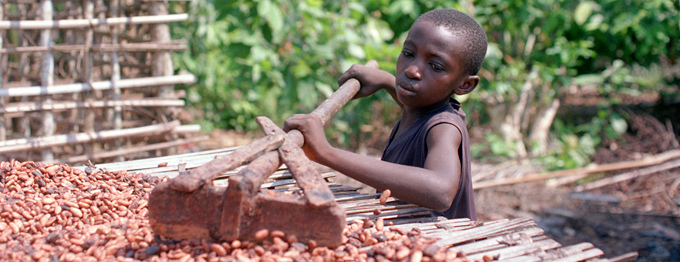
Chocolate is a luxury many of us enjoy quite a lot. For years, I’ve been making a concerted effort to buy ‘Fair Trade Certified’ chocolate, coffee, tea and sugar with the aim of ensuring that producers around the world get a fair wage for the products they grow. Thus, you can imagine my horror when I found out that buying ‘Fair Trade’ chocolate does not guarantee that child labor and/or child slavery was not used in the cacao farming (to be clear, ‘fair trade’ certifiers do not endorse slavery—because of the difficulty of determining whether or not slavery is used, it has been found in certain fair trade farms and they have worked to remedy this situation).
According to the Food Empowerment Project’s efforts to compile research on the subject, the overwhelming majority of cacao (cocoa) production occurs in Ghana and the Ivory Coast (in the region of West Africa). Investigative journalists and human rights investigators have discovered that child labor and, more specifically, child slavery are rampant in this region. The cocoa industry in West Africa is shrouded in secrecy and it is increasingly difficult to attain information about working conditions there, but investigations have shown that children and adults are forced to work (often with no pay), are locked up at night to prevent their escaping, are beaten if they refuse to work, they work and live in a hazardous environment and are fed the cheapest food available.
The Food Empowerment Project is working to contact individual companies selling vegan chocolate to find out where they source their cocoa to create an exhaustive list of brands they do and do not feel comfortable recommending. Clif Bar, in particular, has refused to disclose where they source their cocoa and the Food Empowerment Project has launched a petition to demand transparency from this company that claims to be ‘socially responsible’. If you want to read more about the plight of enslaved children and adults in the West African chocolate trade, click here. NOTE: I actively choose not to use the term ‘slave’ because I feel that it implies that to be enslaved is that person’s inherent purpose and plight. Instead, the term ‘enslaved person’ acknowledges that slavery is a external condition that has been forced or imposed on the person (similar to the ‘farm animal’/’farmed animal’ problem)—not who they are.
Why should animal advocates care about this issue?
How can we NOT care?! I have encountered some vegan/animal rights advocates who have been resistant to promoting activism that works on issues like child slavery in the cocoa industry, the argument being that this is not an animal rights issue. These advocates for animals argue that any activism based on human forms of injustice and oppression detracts attention from ‘the animal issue’. But animal rights advocates and anyone else concerned with any other social or environmental justice issue cannot afford NOT to care about suffering and injustice near or far, human or animal. If we think we can end the exploitation of animals while simultaneously turning our back on distant children who suffer for our lifestyle of luxury—if we think we can continue to eat vegan chocolate produced by enslaved children or continue to buy vegan boots produced in a sweatshop—we will never make lasting change on any front. We are sorely mistaken if we think we can act with tunnel vision about any social justice issue and make a difference without, at the same time, actively resisting other forms of injustice. Conditions of injustice for humans, animals and the environment are deeply intertwined and the best thing we can do is to actively and constantly expand our circle of compassion outwards as we become more informed.
What can you do right now to help?
1. Use the Food Empowerment Project’s recommendation list when purchasing chocolate.
2. SIGN THE PETITION to ask Clif Bar to reveal country-of-origin information for the chocolate they use.
3. Keep up-to-date on what the Food Empowerment Project is up to—they run some great campaigns for global food justice. And you can always donate to help their work if you feel so inclined.
 Follow
Follow

I just commented over at my blog but wanted to add a note here too.
There I said: “Thank you, Katie! I’ve linked to your post in a note at the end of this post and went back to edit which of these recommendations are on the FEP recommendation list! Very very much appreciate the information – great timing and thank you for writing about it!”
So – thank you, again! I was glad to see at least half of the brands listed were on the recommended list. PHEW.
Thanks so much for your quick response and for updating your post with FEP’s info. Luckily, it seems like a lot of the smaller, more thoughtful vegan brands source their cacao ethically (or at least are working on it), but I was surprised to learn that there were a few on FEPs list that I used to buy, thinking they were an okay choice! I guess we’re always just working on evolving to make to more ethical choices as we get more information and have great organizations like FEP doing this kind of work. Anyway, I appreciate your comments, update and your posts this week about vegan gift giving. 🙂